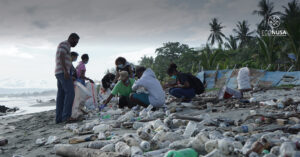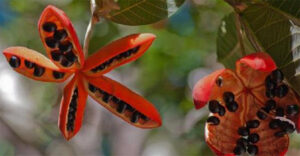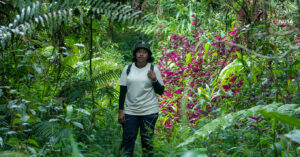
Coffee has been growing as popular commodity in the Land of Papua. This premise was obviously seen from public enthusiasm during the second Papua Coffee Festival on 21-23 November 2019 in Jayapura, Papua, with the participating 40 booths. As reported by local media , www.jubi.co.id, Piter Tan, the owner of Pits Corner Coffee, said that the first Papua Coffee Festival in 2018 has doubled the number of coffee shops as from dozens up to 30-40 coffee shops. He said that the increase also happened to the number of young Papuans who work as barista.
Titus Rawai, the chief of Village-owned Enterprise (BUMKam) of Manainin Village in Kosiwo District, Kepulauan Yapen Regency, attended the festival to represent Ambaidiru coffee farmers. Unlike before, he brought 75 kilograms of green bean and 50 kilograms of powdered coffee for the festival. Titus’ powdered coffee was sold out. Unfortunately, unlike the former festival, coffee auction was cancelled in the event.
Coffee festival was held from 9 in the morning up to 11 at night. The festival visitors left the venue at Bank Indonesia of Papua Representative at midnight. Having cleaned up his booth, Titus could only get rest at the motel at 1 early in the morning.
“On the last day I slept at 3 in the morning and at 4 I should get up to catch up the plane at Sentani Airport at 5. My flight was Trigana which will take 1 hour and 20 minutes flight to Serui. Fortunately, there were many visitors on the last day buying my coffee,” said Titus.
Coffee plantation in the Land of Papua has been existing since the early 20th century. This was influenced by the influx or evangelists. Their arrival brought new consumption pattern which was unfamiliar to the indigenous community. The Sumatera Post (edition 20 April 1929 taken from Kompas.id), reported that coffee was initially planted in Ambaidiru by Zending DC Bout.
“In addition to coffee, people were formerly asked to plant white grape which does not match to the local community consumption pattern. In the 80’s era, I could taste the white grape taken from here,” said Yohanis Wanane, a resident of Serui City who works as Agriculture Facilitator of Yapen Regency’s Independent Village Development Program (PPDM).
According to Yohanis, the demonstration plot for coffee seedbed was located at the central of Serui City that was formerly the Serui Airport. In addition to coffee, other plants are clove and vanilla. From Serui, the coffee seed was brought with noken to Ambaidiru up through to Jayapura. There are three coffee plots in Ambaidiru, namely Kakupi, Paputum, and Kitun.
Coffee plantation began to grow in 1957-1959 under the Dutch government. The plot stretched around 81.27-hectare plots of land. The profile of Ambaidiru Coffee created by BUMKam Manainin shows that the cultivation of coffee went through some stages. The local government started to develop Robusta coffee of Klon BP 42 and BP 528 since 2004 up to now.
According to Yafet Rawai, the chief of Manainin Village in Kosiwo District, Kepulauan Yapen Regency, coffee plot management was inherited from generation to generation. Yafet inherits his coffee plot to his children. The eldest up to the third children get 5,000 square meters of plot and the youngest gets 3,000 square meters. Not only coffee, Yafet also cultivates cabbage, chili, pumpkin, lettuce, long bean, bean, green onion and celery on different plots. The other people in Ambaidiru also does the similar cultivation.
Editor: Leo Wahyudi




